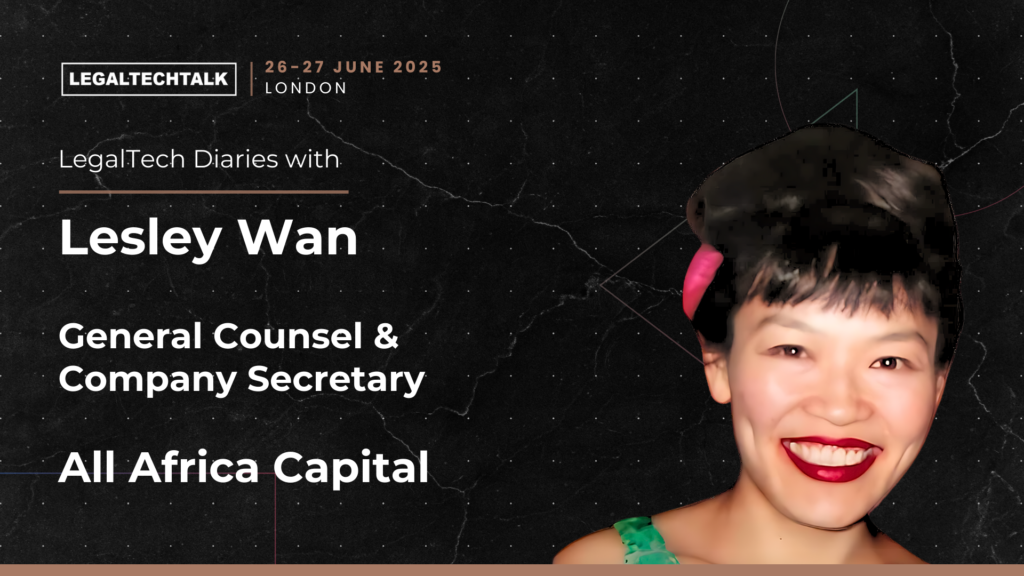In this interview, Charlotte Johnstone of LegalTechTalk speaks with Lesley Wan, General Counsel and Company Secretary at All Africa Capital, about the challenges women face in the legal profession. Lesley discusses the importance of diversity in leadership, addressing pay disparities, and providing equal opportunities for women lawyers. She highlights the need for balanced instruction allocation, proactive support from law firm partners, and transparent reporting on gender pay. Wan also emphasises the importance of recognising and accommodating different networking styles among women lawyers, particularly those with family responsibilities. The conversation provides insights into the ongoing efforts to achieve gender equality in the legal field and suggests practical steps for improvement.
Charlotte Johnstone: The legal world is traditionally a very male-dominated profession, particularly with partners and the judiciary remaining male-centric — how can we ensure that women get a seat at the leadership table?
Lesley Wan: The easy answer is to require a quota to ensure that women are given a seat at the table. If women are not given the opportunity to be included at the leadership table, this could mean that decision making may not necessarily have taken account of appropriate and relevant diverse experiences which could impact on the population and thus, may not result overall in the best outcomes. You can’t take account of other relevant factors if you are not aware of them, so bringing women to the table will likely result in a more balanced view and enable male colleagues to take these into consideration as part of the decision making process.
Charlotte Johnstone: What do you think is the biggest hurdle women in law face and how can law firms help women overcome it?
Lesley Wan: One area of concern which was highlighted to me earlier this year is that women lawyers in private practice are still not getting access to the same level of instructions as their male counterparts. This is despite the huge efforts of the general counsel community to implement and encourage balance, diversity and inclusion in their legal panels and the request for relevant management information to support this. As general counsel clients, we also have a responsibility to think about who we want to instruct on legal matters, and we should be mindful of also taking proactive steps to support the progression of up and coming female associates, simply by instructing them directly, but still with partner responsibility and oversight.
This means the work remains within the relevant business team under the partner’s purview, but with the positive impact of empowering the female associate and building confidence and trust in the relationship. We should also continue to support female partners in the same way that we have done with our male partner relationships. A balanced approach is healthy in this regard. Law firm partners should take steps to equally promote women senior associates and newly made up female partners to their clients and encourage clients to do the same so that there is a good balance of work being shared across the legal teams. This will also help with managing the wellbeing and stress levels of lawyers in the team.
Charlotte Johnstone: What areas do you think still need progress?
Lesley Wan: I still think there needs to be a more concerted effort by the management in private practice law firms (and other related legal colleagues) to ask themselves honestly if they are paying their female lawyers/partners at the same level of remuneration as they do their male counterparts. Time and again I am reliably informed that many senior female lawyers are given a salaried status or less remuneration (although with the title “partner”), and their progression to equity is not as fast paced as their male colleagues. We still seem to be lagging behind on “Equal pay for equal work”. Perhaps law firms should start reporting on gender pay — this would provide valuable data and transparency for colleagues, peers and clients. In this regard, I also think it would be helpful if private practice law firms/corporations could also have regard for the way in which women lawyers network and operate in the workplace (particularly, with respect to working mothers who may indeed be wearing many different hats due to family status/children/as carers and have time constraints).
We don’t necessarily network in the same way as our male counterparts and would appreciate some support and help in developing our business connections and practice. Women need access to opportunities. Recently one GC contact shared with me that she was privy to a conversation where a young male graduate was having a coffee with an older senior male partner who proceeded to share his vision of the graduate’s future trajectory in the law firm, while reeling off all the connections he would be introduced to enable him to progress quickly through the ranks. This level of support is something women do not generally experience on the same level — and it is part and parcel of how I have observed men network and support each other throughout my career; perhaps because that was their experience of coming up through the ranks and paying it forward. Women would certainly benefit hugely from the same level of support that some of our male counterparts experience. I challenge partners (men and women) to proactively give the same level of support for female lawyers as they do for male lawyers.
Read full LegalTech Diaries Volume 5: https://www.legaltech-talk.com/legaltechdiaries/volume-5/








